 Sobhan Mohmand, Career Expert
Sobhan Mohmand, Career Expert  23 December 2022
23 December 2022
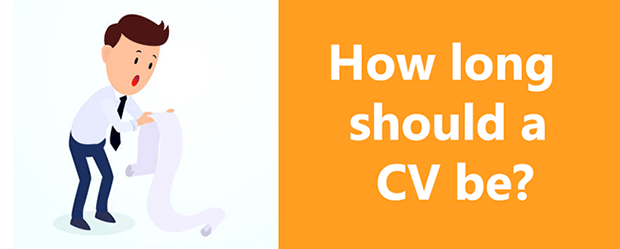
An important aspect of writing a perfect CV is related to the length of your CV.
How many pages should it be? One, two or even three?
The answer is: ‘It depends.’
You see, a CV should have a natural length that is dependent on the applicant’s qualifications, work experience and job sector. Why should a school leaver have a CV which is the same length as someone who has twenty years’ experience?
So the truth is that the length of a CV will vary slightly from applicant to applicant. Nonetheless, 95% of applicants should not have a CV that exceeds two pages.
Use the guide below to find out more about why most CVs should not exceed two pages, the importance of writing concise CVs and how long a CV should be for school leavers, graduates, senior professionals, academics and medical professionals.
Let’s get started!
A CV is a short formal document that contains a brief summary of your work history, qualifications and education. The word ‘CV’ is an abbreviation of “curriculum vitae”, which literally means “the course of one’s life” or the brief story of your career.
A CV is used to apply for jobs.
Standard CVs usually contain the following information:
The perfect length of a CV is considered to be a maximum of two pages.
This length is recommended for the majority of the applicants, including university students, graduates, young professionals and junior managers.
This is the advice that has been given for many decades by recruiters, employers and careers consultants. Below are some of the statements of well-known careers professionals and recruiters about two-page CVs.
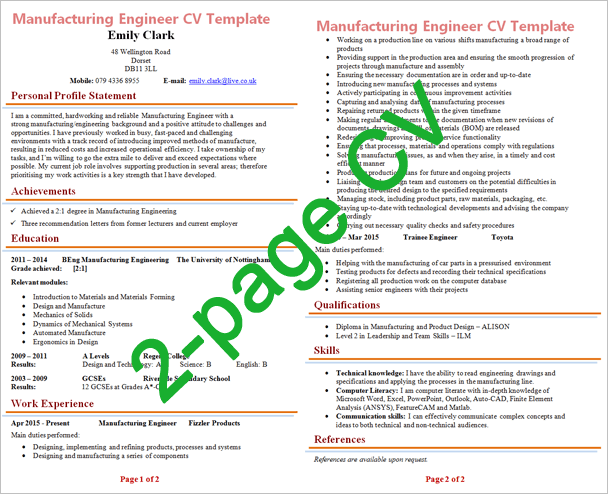
All career professionals agree that short, concise and focused CVs are better than long, text-dense and unfocused CVs. Yet, there is evidence that candidates still submit CVs that are longer than the recommended two pages. Much longer!
James Innes, a leading careers expert and author of several best-selling career help books, said that he has seen CVs over 30 pages long! (The CV book, our definitive guide to writing the perfect CV, James Innes, pg.43).
John Lees, a well-known career coach, was informed by a recruiter that he had received a 45-page CV! (Why You? CV Messages To Win Jobs, John Lees, pg.18).
Sinead English, a career consultant and author, tells about a client who had a 13-page CV. She recalled in her book CV & Interview 101: How to apply and interview for jobs (pg.8): “We had a client who came to us with a thirteen-page CV – font size 8.5. They claimed that everything on there was hugely relevant and nothing could be taken off. They genuinely couldn’t figure out why the hell they were not getting interviews – they had great experience. We got the CV to two focused pages and they got the interview.”
While the above CVs are exceptionally long, even three-page CVs – which are also hated by recruiters – are still being submitted.
A recent survey analysed and evaluated 200 CVs submitted to a search firm and concluded that nearly one-quarter of CVs were over 3 pages long. The authors note that this length puts undue pressure on the reader. (Pitch Yourself: The most effective CV you’ll ever write. Stand out and sell yourself, Faust & Faust, pg.9).
‘So what?’ You may be wondering.
“What is the big deal between submitting a three-page CV versus a two-page CV?”
Let’s find out!
There is a reason why careers consultants advise against submitting CVs longer than two-page CVs: they simply don’t win interviews. There is something fundamentally wrong with long CVs and, as a result, they are usually not even read at all.
The THREE reasons why long CVs are fundamentally flawed:
Many applicants have the erroneous idea that the purpose of a CV is to get them a job. As a result, they try to squeeze in as much information as possible on their CV, in the hope of impressing the employer and securing a job.
This is a totally wrong understanding of what a CV is and its purpose!
The real purpose of a CV is to get you a meeting/interview with the employer.
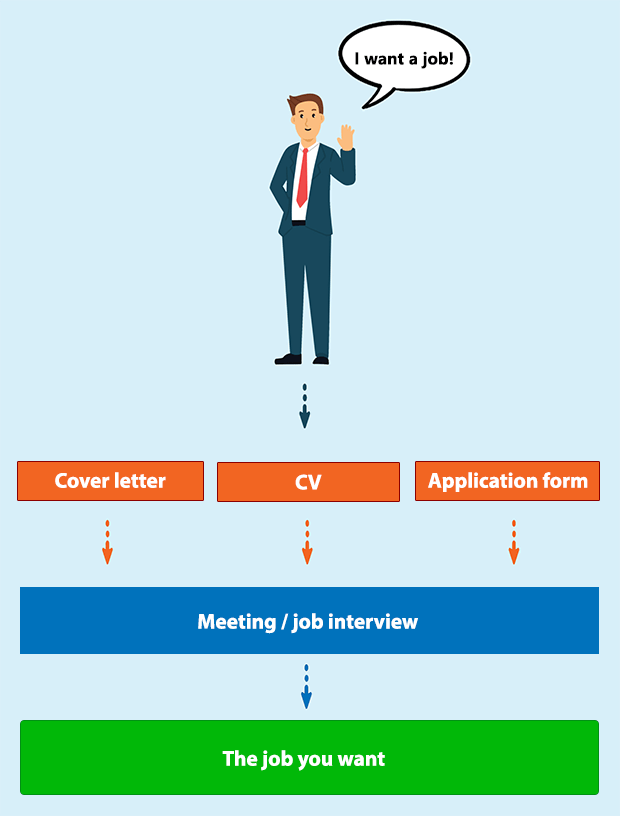
John Lees, a well-known career coach and author, remarked on this phenomenon: “Most candidates believe that their CV needs to say everything important about themselves that might help get them a job. They are entirely wrong. A CV isn’t there to get you a job. It’s there to get you into a meeting. This might be an interview (with an employer or with a recruitment consultant), it might be a networking meeting or it might be the opportunity to pitch for a piece of work. In other words, a CV is a piece of communication that has only one purpose: to get you into a room with someone who can influence your future.” (Why You? CV Messages to Win Jobs, John Lees, pg.7).
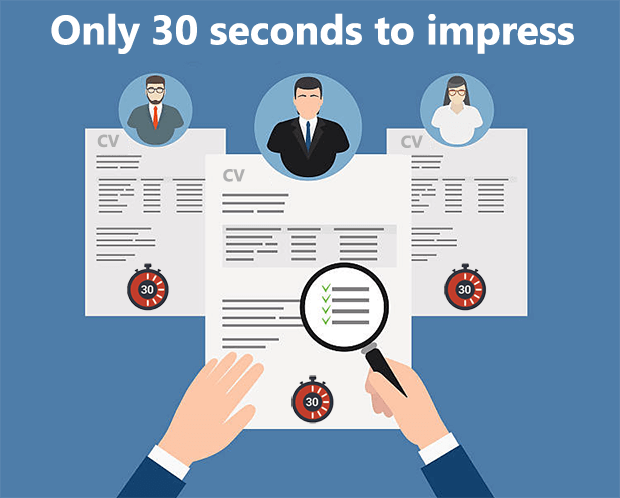
Contrary to common perception, HR executives don’t just sit around reading CVs all day long. They have a variety of other tasks and duties to perform including administration, attending meetings, working on training/workshops and much more besides.
Paul Hichens mentions in The One Page CV: Create your own high impact CV (pg.85): “Indeed, some of the HR executives I have spoken to have told me that they allocate only a relatively small time slot in their working week to look through CVs. Moreover, frequently this time slot is disproportionate to the number of CVs received. Consequently, there has to be some give, and sometimes this results in less enticing CVs being discarded before they are even read.”
So how long do recruiters spend reading each CV?
The answer: less than 30 seconds.
Many career experts have alluded to this number, including:
• Jenny Rogers, an executive career coach, writes the following in her book Great Answers to Tough CV Problems: CV Secrets From a Top Career Coach (pg.8-9): “Chapter: From the employer’s perspective: 30 seconds to make an impression. The employer is busy and preoccupied. Although hiring new staff is one of the most critical tasks any boss has, somehow many bosses manage to overlook its importance. When unemployment levels are high and there is a glut of good people, the employer can also be deluged with applications, so even where they claim good practice, the temptation to skimp on time and care can be overwhelming. The average amount of time spent on the first scanning of a CV is a few seconds, perhaps 20, or if you’re lucky, 30. Your CV must instantly make the right kind of impact.”
• Rowan Manahan, an experienced recruiter, writes in Ultimate CV: Trade secrets from a recruitment insider (pg.7): “Chapter: A busy recruiter with a large pile of CVs to wade through is simply going to scan each one for 15-30 seconds. With no malice intended, a recruiter is looking for a reason to dump you in the bin and, if you have not sold yourself in the first 30 seconds, that is where your CV will end up. No one has the time or inclination to plough through three, four or five pages of your professional history and education when they might have another 30, 100 or even 500 documents to read after yours. Your CV is nothing more than a 30-second advertisement to get you invited to interview.”
• Sue Tumelty, a senior HR executive, writes in CV and Interview Handbook (pg.68): “Present information in bite-sized chunks. Most research on how long recruiters spend reading a CV agrees is that a 10-20 second scan is all that can be expected on the first reading. Your recruiter will look more favourably on your application if they do not need to search for information. Use clear headings and experiment with the use of bold type, underlining and line spaces to divide your CV into manageable sections.”
• Faust & Faust write in Pitch Yourself: The most effective CV you’ll ever write: Stand out and sell yourself (intro.): “Chapter: Less than 30 seconds to impress. You have less than 30 seconds to make that first impression. Yes, less than 30 seconds. 20 to 30 seconds for a first pass scan of your CV. Can you sell yourself in less than 30 seconds? Can you use your 30 seconds to answer the only question that matters in the whole recruitment process, ‘What will you do for me? What do you offer? What and where is your value add?’ That is less than 30 seconds to be selected or deselected.”
• John Lees, a well-known career coach, writes in Why You? CV Messages To Win Jobs, John Lees (pg.26): “Chapter: Your 15 seconds of fame. Estimates of the average attention given to a CV vary – anything between 15 and 30 seconds. This is half true. It is true in the sense that any recruiter who has to deal with over 100 CVs is going to have to find a way of sifting through them very fast – scanning them (usually by eye) for key phrases or pieces of information to make an interview shortlist. You may think that an interview is just a conversation, but it’s expensive to arrange and even more expensive to put one or two more professional staff into a room all day. So organisations need to pre-select just the ones that look most suited to the job. A first sift (also known as “pre-selection” or “top slicing”) is usually required to cut the pile down. In our CV survey one busy HR manager wrote: “If I am scanning around 500 CVs for a role, my first-pass filter of them is measured in seconds rather than in minutes.”
All of the above is cumulative evidence that employers tend to read each CV for less than 30 seconds. Therefore, the shorter the CV the better.
Employers normally will not bother with any CVs that are longer than the maximum of two pages.
Given the fact that employers only tend to look at your CV for around 20-30 seconds, you need to make sure that all the important information that the employer is looking for stands out and is found at a glance.
This can only be achieved with short CVs.
Long CVs tend to obscure important information.
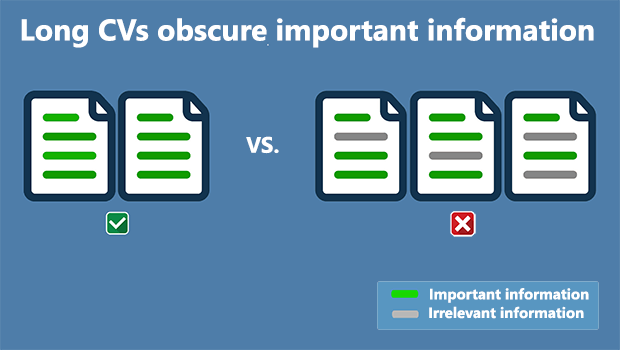
This is one of the main reasons why career professionals advise against long CVs!
Some applicants have the erroneous idea that the length of the CV is fixed in all circumstances and for all applicants.
As a result, they use minuscule fonts, bad formatting and cramp in lots of information into one or two pages of their CV – making their CVs completely unreadable!
This defeats the whole purpose of a CV. Your number one goal is to make your CV enticing enough to get read. Without that, it is irrelevant whether you have phrased everything perfectly or included only the most relevant information.
The truth is, there is no such thing as a single fixed length of a CV for all applicants; it will vary from applicant to applicant and sector to sector.
Sue Tumelty, a senior HR executive, writes in CV and Interview Handbook (pg.69):
“If you bring two or more recruiters together in one room and ask them about how long a CV should be, prepare yourself for a long and possibly heated argument. Some recruiters insist all CVs should be two pages long. This view is echoed by many books and websites offering CV advice, which all urge you to keep your CV to a maximum length of two pages.
However, speak to a management consultant and you may be told that recruiters in that sector would simply not bother to read beyond the first page of a CV.
Conversely, recruiters of software developers or specialist contractors would expect a CV to average four pages because they would want to see a summary of the contracts completed during the previous two to five years.
The answer, therefore, lies in what is normally expected from within a sector.”
Paul McGee writes in How to write a CV that really works (pg.51):
“It is difficult, in my opinion, to say categorically how long your CV should be. The readers of your CV have different preferences. However, here are some guidelines from my experience. Most people agree that there is no need for a CV to be any longer than three pages – and quite often two pages are enough. There are those that argue that a one-page CV proves most successful and that it should be possible to include all relevant information on one page. Certainly, if the reader is inundated with CVs and only has to glance through one page of yours, this may be an advantage. However, I have seen no evidence to suggest that someone is more likely to succeed with a job application if they have a one-page CV as opposed to a two- or three-page one. The key, I believe, is to concentrate on what you want to tell the reader and then decide how long your CV will be.”
Clearly, when it comes to writing a CV, one size does not fit all.
Below you will find a breakdown of the ideal CV lengths for a variety of applicants based on their qualifications, work experience and job sector.
The recommended CV length for a speculative CV is one page.
Rachel Bishop-Firth, an experienced recruiter and personnel manager, writes in The Ultimate CV: Win Senior Managerial Positions with an Outstanding Resume (pg.37):
“Getting your message over.
Your first aim is to make sure your CV gets read. Recruiters are busy people. They will usually give each CV a quick scan, pick up the best for a more thorough reading, and pick only the very best of those to invite for an interview.
This means that your CV should be short. A good rule of thumb is:
The recommended CV length for entry-level jobs is one page.
The following people fall under this category:
Susanne Christian, a qualified careers coach, writes in Young Jobhunters: Building a Great C.V. (pg.16):
“There are recommended lengths for CVs, usually one or two sides of A4 – one page is most likely for school or college leavers. If you have a lot of work experience, do a lot of activities or have a lot of qualifications, you may end up with a two-page CV. Incidentally, even people with long careers don’t usually have CVs longer than two sides. That’s the usual recommended maximum.”
James Innes, a leading careers expert and author of several best-selling career help books, writes in The CV book, our definitive guide to writing the perfect CV (pg.43):
“I always advocate a one-page CV if it is feasible – and some recruitment agencies, especially headhunters, may insist on a one-page CV. Failing that, two pages are entirely acceptable and, in some circumstances, it may be acceptable for a CV to run to three or more pages, but only for certain special cases, e.g. medical, engineering, etc.
People often feel that a one-page CV is worth less than a two-pager, but this is definitely not true. It is much better to have a good, strong one-page CV than a two-page one that is padded with unnecessary information. You should always be aiming to exclude irrelevant information which may distract from other important points.”
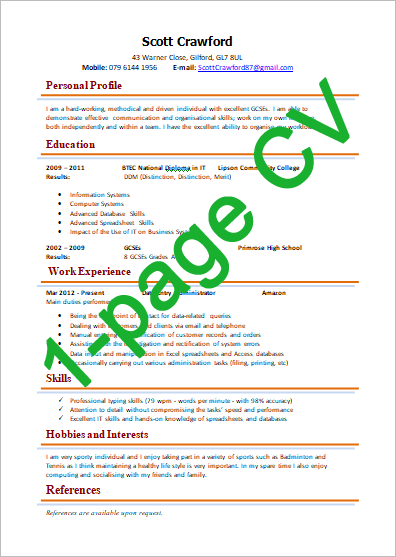
The recommended CV length for a graduate is either one or two pages.
As a graduate, you would have gained many qualifications from your school, college and university studies. You would also likely have some work experience and developed transferable skills in your studies and part-time/voluntary jobs. All these things need to be mentioned on your CV to portray you as a strong candidate for the role. Hence, a graduate CV, unlike a school-leaver CV, can be two pages long.
Note: Graduate CVs should never be any longer than two A4 pages.
John Lees, a well-known career author, conducted a survey and found that two-thirds of employers prefer your CV to be no more than two pages long. Only 20% feel that a CV of three pages is acceptable. (Why You? CV Messages To Win Jobs, John Lees, pg.18).
The recommended CV length for senior managers, executives, directors, engineers, consultants and contractors is two or three pages at most.
If you have many years of experience, your CV should only focus on your current key selling points rather than on documenting your whole career to date.
Remember, the aim of a CV is to get an interview so you only need to include information that is going to help you get that interview. Once you are talking to the employer, you will have the opportunity to fill in any missing details and sell yourself.
As mentioned earlier, Sinead English, a career consultant and author, had a client with a 13-page CV but never got invited for interviews. Only after cutting the length down to two pages did they secure a job interview! (CV & Interview 101: How to apply and interview for jobs, pg.8).
The moral of the story is that short and focused CVs secure more job interviews!
Rachel Bishop-Firth, an experienced recruiter and personnel manager, writes in The Ultimate CV: Win Senior Managerial Positions with an Outstanding Resume (pg.37):
“Your CV should be short.
A good rule of thumb is:
Rebecca Corfield, a writer and expert on career development, outlines the following three scenarios in which a CV may be slightly longer than the recommended two pages:
(Preparing the Perfect CV: How To Make A Great Impression And Get The Job You Want, pg.11).
Note: Even senior-level CVs should never be any longer than three A4 pages.
Paul Hichens mentions in The One Page CV: Create your own high impact CV (pg.84): “I have been told by numerous HR executives that they don’t read CVs which are longer than three pages.”
The recommended length for a specialist, academic, scientific and medical CV is three or four pages at most.
The reason why these CVs can be longer than the recommended two pages is that they are required to include additional details such as lists of academic publications or a list of all the projects/procedures completed by the professional.
A number of career experts have alluded to this in their writings.
Julie Gray, a professional CV writer, mentions in Get That Job With The Right CV: Teach Yourself (pg.171) the different scenarios in which CVs can be longer than two pages and recommends including publications in a separate appendix to keep the main CV concise and focused.
She writes:
“Despite your best efforts, there will be some things you cannot fit onto two pages. These might cover:
This doesn’t mean you can ignore relevance and brevity. It will still benefit you to select the most recent and meaningful examples. You could provide the requested details in a supplement or appendix (as you might do with references) and therefore still leave your main CV powerfully concise.”
A CV should be presented in full pages, with no space left at the end of the page.
Consider the following example.
Imagine if you have a guest and they ask you for a glass of orange juice.
It would look really strange if you were to offer them half a glass of orange juice!

Similarly, make sure your CV consists of full pages and looks complete and presentable. It should never be 0.5 or 1.5 pages. You need to add or remove information to make it fit into either one full page or two full pages. You can also increase or decrease the font size and line spacing between the paragraphs to make it into one or two full pages.
James Innes, a leading careers expert and author of several best-selling career help books, commented on these types of CVs: “A 1 ½ page CV tends to look incomplete and weak.” (The CV book, our definitive guide to writing the perfect CV, pg.43).


What is the ideal length of a CV?
The recommended CV length for most applicants is a maximum of two pages. This is applicable to 95% of all the applicants including students, graduates, young professionals and managers. Only in exceptional circumstances can a CV be more than two pages, such as for academics and medical professionals.
Should a CV be one page or two pages long?
Your CV should be short and concise, preferably one page long. You can go up to two pages if you have more work experience, education and skills to include on it.
How long should a first CV be?
Your first CV should be one page long. If you have finished your college studies and have additional work experience, you may go up to a maximum of 2 A4 pages.
How many pages should a senior-level CV be?
A senior-level CV should be two pages long. You may go up to a maximum of three pages if you have a lot of experience, education and important details to include.
How many pages should a UK CV be?
A standard CV in the UK should be a maximum of two pages long; the shorter the better. This is the standard rule for most people. UK careers advisors recommend a one-page CV for applicants who apply for entry-level positions, a two-page CV for most medium/high-level jobs and a three-page CV for senior, specialist roles.
Is a 2.5 CV too long?
Yes. A standard CV should never be longer than two A4 pages. You should remove any irrelevant, outdated or repetitive details from your CV to make it fit into two pages. Furthermore, a CV should be presented in full pages rather than in 1.5 or 2.5 pages.
Good luck with writing your perfect CV and securing job interviews!